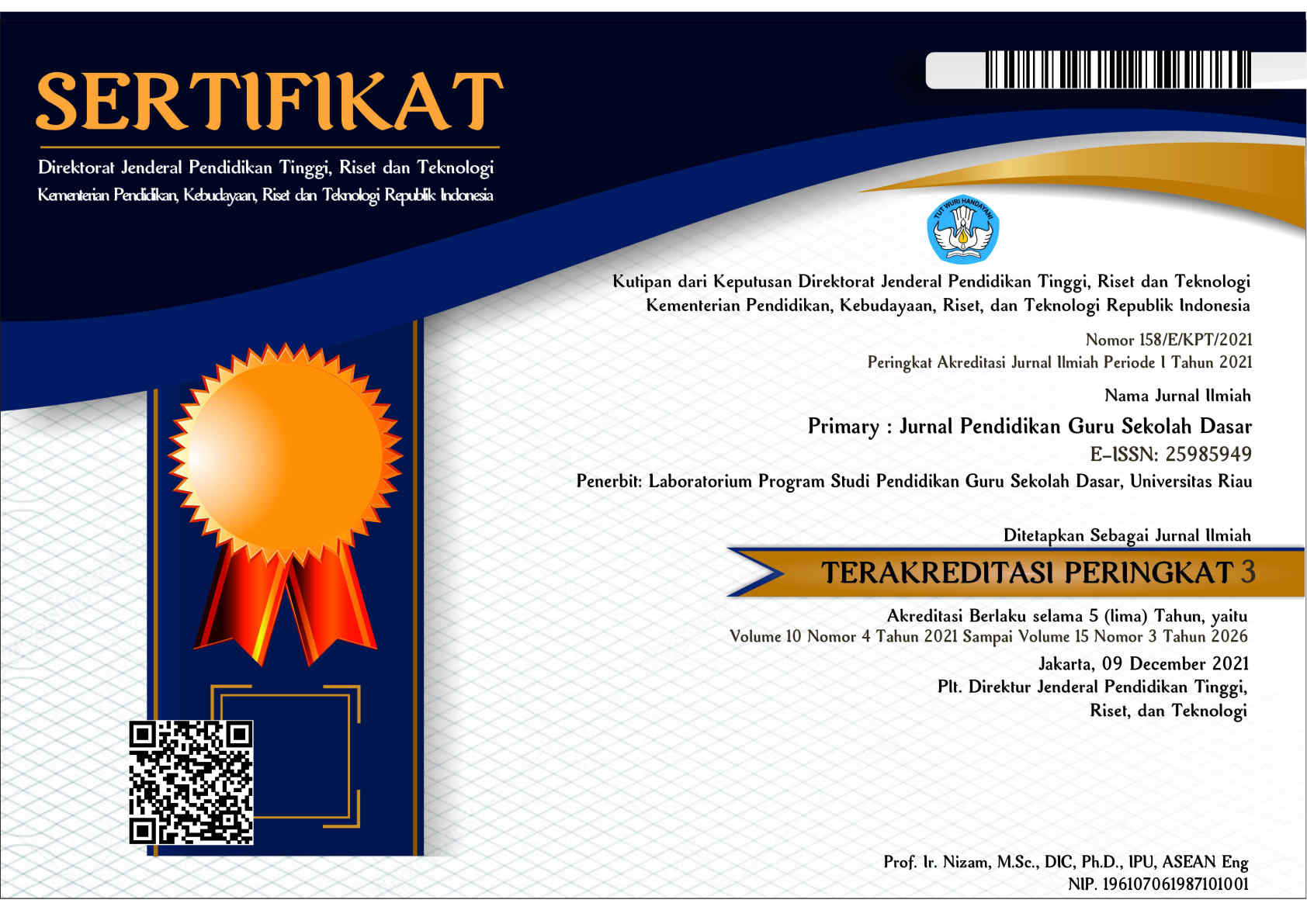PENGARUH PROBLEM BASED LEARNING DAN THINK PAIR SHARE BERBASIS BLENDED LEARNING TERHADAP HASIL BELAJAR MATEMATIKA
Abstract
The COVID-19 pandemic has changed the learning system in Indonesia from face-to-face learning to distance. Such changes in the learning system need to be addressed with the use of learning models that are in accordance with the current distance learning system. Blended learning is a learning approach that combines face-to-face and online learning as an alternative to this changing learning system. This study aimed to determine the effect of the model on problem based learning (PBL) and think pair share (TPS) based on blended learning on students' mathematics learning outcomes and knowing the differences in learning outcomes between-based PBL and TPS models model blended learning. This study utilized quantitative research by comparing two learning models to students' mathematics learning outcomes. The research sample was from sixth grade students of SD N Mojo 1 and SD N Trengguli 3 in Kabupaten Demak. The results showed that the PBL model based on blended learning had an effect of 80.5% on students' learning outcomes, the TPS model based on blended learning had an effect of 71.9% on students' learning outcomes, and both models had no difference on the students' learning outcomes. This showed that the blended learning approach in the PBL and TPS models significantly influenced students' mathematics learning outcomes.
Keywords
Full Text:
PDF (Bahasa Indonesia)References
Hamdayama, Jumanta. (2014). Model dan Metode Pembelajaran Kreatif dan Berkarakter. Bogor: Ghalia Indonesia.
Handayani, Riska Dewi. (2017). Pengaruh Model Pembelajaran Kooperatif Tipe Think Pair Share Terhadap Hasil Belajar PKn Siswa Di Kelas IV MI Terpadu Muhammadiyah Sukarame Bandar Lampung. Jurnal Pendidikan dan Pembelajaran Dasar. Vol 4 No 2: 107 - 123.
Haruehansawasin, Sanit. & Kiattikomol, Paiboon. (2017). Scaffolding in problembased learning for low-achieving learners. The Journal of Educational Research. Volume 2. Hal 111-116.
Johnbosco, Okekeokosisi & Okigbo. (2017). Effects of Think Pair Share Instructional Strategy and Gender on Secondadry Scholl Students Achievement in Computer Studies. South Eastern Journal. Hal 37-45.
Kumar, R. & Refaei, B. (2017). Problem-Based Learning Pedagogy Fosters Students’ Critical Thinking About Writing. Interdisciplinary Journal of Problem-Based Learning, Vol 11 (2). Page 21 - 26.
Komalasari, K. (2013). Pembelajaran Kontekstual Konsep dan Aplikasi. Bandung: Refika Aditama.
Khoiroh, Ni’matul. 2017. Pengaruh Model Pembelajaran Blended Learning dan Motivasi Belajar Terhadap Hasil Belajar Siswa. Jurnal Penelitian Ilmu Pendidikan, Volume 10, Nomor 2, Hal 97-110.
Offiah, F.C. & Okonkwo, C.O. (2011). Cooperative learning strategy and students’ academic achievement in chemistry. UNIZIK Journal of STM Education. Volume 1(2), 63-70.
Prahmana, Ari Gita. 2016. Pengaruh Model Problem Based Learning (PBL) Terhadap Hasil Belajar Dan Keterampilan Proses Sains Dalam Pembelajaran Fisika di SMA. UNEJ. VOL. 5. No. 1, hal 129-134.
Raditya, I Wayan. (2015). Pengaruh Model Pembelajaran Kooperatif Tipe Think Pair Share (TPS) Terhadap Hasil Belajar IPA Siswa Kelas VI SD Gugus Letda Made Putra Kecamatan Denpasar Utara Tahun Ajaran 2014/2015. Jurnal Mimbar PGSD Universitas Pendidikan Ganesha. Vol 3.
Shisigu, Aweke, & Zerihun, Anibo (2017). Problem-Based Learning and Conceptual Understanding of College Female Students in Physics. EURASIA Journal of Mathematics. 2018. Vol 14(1): hal 145-154.
Tirtarahardja, Umar. (2005). Pengantar Pendidikan. Rineka Cipta.
Widiara, I Ketut. (2018). Blended Learning Sebagai Alternatif Pembelajaran di Era Digital. Jurnal Purwadita, Volume 2, Nomor 2, Hal 50-56.
DOI: http://dx.doi.org/10.33578/jpfkip.v10i5.8487
Refbacks
- There are currently no refbacks.
Copyright (c) 2021 sugiyanti Sugiyanti, Murtono Murtono, Sri Surachmi W

This work is licensed under a Creative Commons Attribution-NonCommercial-ShareAlike 4.0 International License.
____________________________________________________________
Primary: Jurnal Pendidikan Guru Sekolah Dasar
Secretariat
Program Studi Pendidikan Guru Sekolah Dasar
Gedung B1, FKIP Universitas Riau
Kampus Bina Widya Km. 12,5 Simpang Baru Panam
Pekanbaru Riau Indonesia 28293
e-mail : primary@ejournal.unri.ac.id



